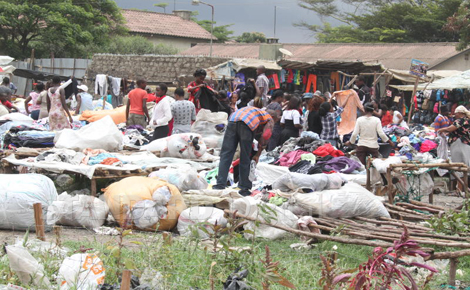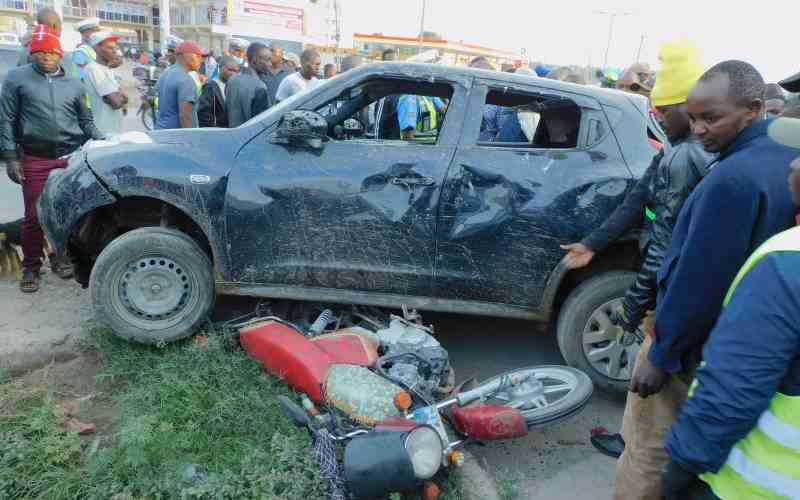 |
|
Small business people have returned to the area close to the railway line where a crash killed a dozen. |
NAIROBI, KENYA: Hawkers dance while singing at the top of their lungs, Mama Mboga tends to her customers, a boda boda operator struggles to balance what seems like a cumbersome load and a second-hand clothes dealers braves the morning sun as he waits for a substantial purchase.
Poorly-built structures shield fresh vegetables and fruits from the scorching sun; everyone is busy going about their business in this thriving market and seemingly ordinary market
However, right in the middle of the makeshift stalls is an active railway line. Traders seem totally oblivious to the looming danger of oncoming trains. In fact, some of the stalls have been put up as close as two metres from the tracks.
Exactly one year ago, a horrific accident involving a bus and a train occurred, leaving 10 dead and another 21 people severely injured.
Traders at the Mutindwa market were shocked by the accident, but as is the Kenyan culture, they seem not to have learnt anything from it.
METRES AWAY
The day after the accident, business resumed as usual; the only indication of the previous day's horror was a few destroyed stalls. Are these traders waiting for another accident to happen or are they simply not afraid for their lives?
A few days after the crash, Transport Cabinet Secretary Michael Kamau ordered the destruction of all structures in the market. He directed that the nearest structure to the railway line should be five metres away.
The traders obeyed the order for a few days but improvised by laying out sacks on which they displayed their produce.
“All the CS wanted was for the structures to be demolished. Many of the traders moved their businesses to the other side of the road but we who were left resorted to laying our goods on the ground,” said one trader who sought to remain anonymous.
Steven Ndung’u, a boda boda operator in the area, said he was present during the accident and described it as one of the shocking events of his life.
He said the incident involving an ‘Umoinner’ mini-bus and a train occurred early, around 6am, before most traders had made their way to the market.
“I had just reported to work when I witnessed the accident. The bus from Umoja Phase Two was headed for town when it got stuck on the railway line.
CROSS OVER
"Efforts by the driver to cross over before the train caught up were futile and the inevitable happened,” Mr Ndung'u said.
Stay informed. Subscribe to our newsletter
You would think a man like Ndung'u learned a lesson from the ordeal.
But this is what he had to say: “People around here are aware of the danger but then again, this market is our only source of income.”
 The Standard Group Plc is a
multi-media organization with investments in media platforms spanning newspaper
print operations, television, radio broadcasting, digital and online services. The
Standard Group is recognized as a leading multi-media house in Kenya with a key
influence in matters of national and international interest.
The Standard Group Plc is a
multi-media organization with investments in media platforms spanning newspaper
print operations, television, radio broadcasting, digital and online services. The
Standard Group is recognized as a leading multi-media house in Kenya with a key
influence in matters of national and international interest.
 The Standard Group Plc is a
multi-media organization with investments in media platforms spanning newspaper
print operations, television, radio broadcasting, digital and online services. The
Standard Group is recognized as a leading multi-media house in Kenya with a key
influence in matters of national and international interest.
The Standard Group Plc is a
multi-media organization with investments in media platforms spanning newspaper
print operations, television, radio broadcasting, digital and online services. The
Standard Group is recognized as a leading multi-media house in Kenya with a key
influence in matters of national and international interest.










